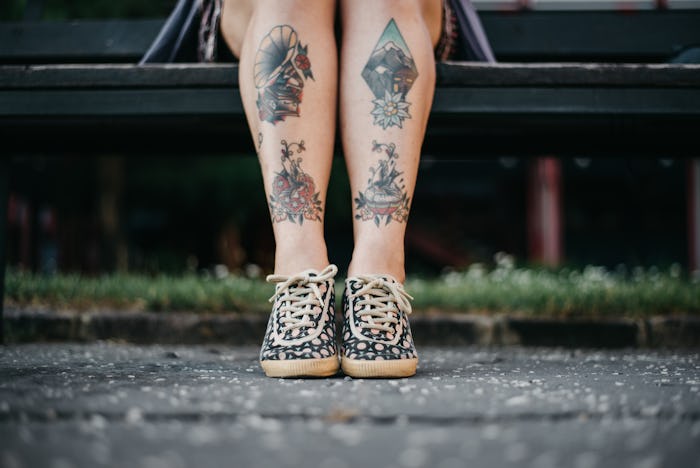Life
7 Surprising Things Tattoo Artists Wish You Knew After You Got A Tattoo
Getting a tattoo is a big commitment. Whether you look at it as a serious choice, in which you need to consider a variety of things before going and getting inked, or you get your tattoo on a whim, there are things that you need to know that will come up after you get your tattoo that you might not think about or consider, regardless of how much thought you put into the initial decision. There are things tattoo artists wish you knew after you got a tattoo that might not be secrets, necessarily, but that all too many people disregard or don't hear or consider in the first place.
Generally speaking, your tattoo artist is a serious expert and the things that they take the time to tell you or otherwise share with you are important and worth listening to. Though not every single tattoo artist is going to know all there is to know about tattoos, skincare, and related topics, particularly if they're young or relatively new to the industry, as James Maynard, a tattoo artist and owner of Last Morning Tattoos in Joplin, Missouri, tells Romper, if your artist tells you how to take care of your tattoo, what to avoid, or anything else, you should definitely take note.
If your tattoo artist doesn't give you much information, however, or if you didn't hear them or listen to them for whatever reason (getting a tattoo is exciting, after all), you might not know that there's still a lot that you need to know (and do) after getting a tattoo. From lotions to sun protection and more, tattoo artists wish that you knew quite a few different things, even after leaving the tattoo studio.
1Keep It Covered For 24 Hours
Keeping your tattoo covered for about 24 hours after getting it helps protect it when it's still brand-new. Maynard says that covering it for a short time before "washing, going about your normal cleaning routine," will set you off on the right track.
2If Your Artist Put A Paper Towel On It, Take That Off
Paper towels used to be a typical covering that tattoo artists used to cover new tattoos, but Maynard says that if your artist uses this, you should likely take it off after you leave and use something else instead. Maynard notes that some artists still choose to do things the older way, but that with the additional products available now, something like Saniderm or another protective covering is a better choice.
3Use A Tattoo-Specific Lotion
Because companies make tattoo-specific lotions, you might find that it's just easiest to use something like that on your tattoo. Plus, you can be confident that what you're using will help, not hurt, things. Maynard says that avoiding alcohol or petroleum-based lotions is the most important thing, however, as those can upset your healing skin.
4Always Make Sure It's Sunscreened
Sunscreen is seriously important for protecting all of your skin from the sun, but you might not have realized that it can help keep your tattoo looking its best too.
"I can show people tattoos that were beautiful when they were put down, but now, as the years have passed, the colors have faded out and probably would’ve been preserved a little bit better if I had just worn sunscreen," Maynard says. Make sure you do what you can to protect your tattoo both while it's healing and after it's healed.
5Take Ibuprofen & Ice It
Because this is basically a wound that you're dealing with, an anti-inflammatory like ibuprofen and icing the area can both help with healing, Maynard says.
"Anything that you would do to a normal, ‘I’ve fell and skinned my elbow,’ it’s the same thing, essentially, it’s an abrasion," Maynard adds. "And anything that you would do to that abrasion, you should do to your tattoo. I mean, we want to protect the ink, but at the same time, we want to protect the skin."
6Stay Away From Water
If your tattoo artist (or an after-care sheet that your studio gives you) tells you to stay away from water, you should listen. Maynard recommends staying away from natural bodies of water, for sure, for awhile and for staying away from your own personal pool for at least a few days. Some other artists take it a step further, however, and recommend staying out of the water for at least a few weeks no matter what, as a blog post for Custom Tattoo Design noted.
7If You Have A Question, Go Back To Your Artist
Though it can be tempting to ask your heavily-tattooed friend any and all questions relating to tattoos or tattoo care, you're really better off going back and asking your tattoo artist (or another tattoo artist) instead. Maynard says that just because someone has gotten a lot of tattoos doesn't mean that they know everything there is to know about them.
"Especially first-timers, sometimes they’ll see a little bit of scabbiness and they totally freak out and sometimes they don’t talk to the artist, they talk to their friend, and then that leads to the ever-popular bad Goggle review," Maynard says. "And if they would’ve just talked to their artist, that’s like, hey, certain parts of the body heal differently."
Listening to the instructions that your artist gives you, whether the advice comes right when you're getting your tattoo or at a later date, when you've gone back with questions, can help you feel confident that you're doing the right things to take care of yourself so that your skin will heal well and your tattoo will look its best for years to come.
